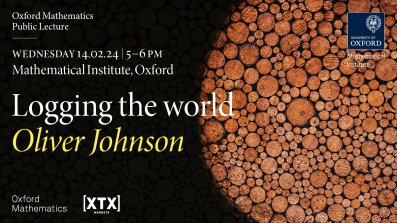17:00
Logging the World - Oliver Johnson
During the pandemic, you may have seen graphs of data plotted on strange-looking (logarithmic) scales. Oliver will explain some of the basics and history of logarithms, and show why they are a natural tool to represent numbers ranging from COVID data to Instagram followers. In fact, we’ll see how logarithms can even help us understand information itself in a mathematical way.
Oliver Johnson is Professor of Information Theory in the School of Mathematics at the University of Bristol. His research involves randomness and uncertainty, and includes collaborations with engineers, biologists and computer scientists. During the pandemic he became a commentator on the daily COVID numbers, through his Twitter account and through appearances on Radio 4 and articles for the Spectator. He is the author of the book Numbercrunch (2023), which is designed to help a general audience understand the value of maths as a toolkit for making sense of the world.
Please email @email to register.
The lecture will be broadcast on the Oxford Mathematics YouTube Channel on Wednesday 06 March at 5-6pm and any time after (no need to register for the online version).
The Oxford Mathematics Public Lectures are generously supported by XTX Markets.


